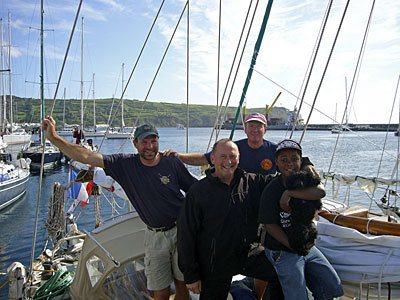On clear nights, the stars were brighter and bigger than Dwight Guss had ever seen before, and they blanketed the skies and dipped down into the moonlit waters surrounding the 1930s Cutter that he and fellow Orcas residents Josh Brown and Antoine and Noam Dalnosky were sailing to the Azores in Portugal.
Those peaceful starlit nights were matched by an equal number of stormy nights, when the crew found themselves battling a treacherous Northern Atlantic with high waves and high seas and winds of more than 50 miles per hour.
“There were a couple of squalls that came upon us, and we were afraid we would not get the sails down fast enough,” Guss said.
It was a romantic voyage for Guss that provided beauty, introspection, challenge and adventure.
More than a year ago, Antoine had approached avid sailors Guss and Brown and asked for their help sailing his 1936 62-foot gaff-rig cutter, Provence, to France. The crossing was planned with the hope that May and June would provide the best weather and the least stormy seas for the historic cutter.
They embarked on May 14 from Charleston, South Carolina and did not see land again for 24 days.
“I have never experienced anything like this because I have never been out at sea this long,” Guss said. “There were times it was very uncomfortable in that dinky little sailboat with the waves crashing around us.”
The weather was frequently rough, and when it was, they took on water through the hatches.
“All of us suffered from sleep deprivation,” he said. “The boat was rocking back and forth and we would have to sleep on the floor because the bunks were rocking too much.”
The wind and seas would pick up and they would back wind the jib and lash the tiller hard over to “lock the boat in irons” until the storm passed.
Once they hove to, even in heavy seas, Provence rode quite smoothly in the troughs of the waves.
“We quickly learned to be aware of sounds that were not quite right during heavy weather,” Guss said. “Every once and awhile a rogue wave would hit us, but other than that it can be quite peaceful, even in the worst of storms.”
Thirteen hundred miles from land and half way to the Azores, their engine broke down. They spent a day and a night taking it apart and rebuilding it with spare parts.
On pleasant days sea turtles, whales, dolphins and “millions of Portuguese Man o’ War jellyfish” were sighted near the boat. When they were 500 miles from land, an exhausted racing pigeon showed up one morning and joined the crew for the rest of the trip.
They supplemented their provisions with fresh fish from the ever-present trolling line, catching Dorado, Guss’s favorite fish.
“During the midnight watch, the heavenly bodies were amazing,” Guss said. “There would be dolphins swimming beside the boat in the moonlight. While the rest of the crew were sleeping I would think about the old times. The Spanish Galleons returning to Spain with the riches from the Incas. We sailed across where the Titanic went down. I thought about the war and the convoy ships heading for Europe. I could almost feel the wolf packs of German U-boats patrolling the North Atlantic and sense that so many people had sailed across that same part of ocean.”
After 2600 miles they were anxious to see land. They thought they would be able to see it when they were 80 miles out, but because of the rain and low clouds, they were only 20 miles away when they finally spotted it.
“Like so many people who have crossed an ocean, the first sight of land was exhilarating,” Guss said. After three and a half weeks of only seeing water, I experienced what so many people have felt like when they see land. The whole crew got quite excited.”
The first steps on land left them laughing so hard they could barely walk down the dock as they weaved from side-to-side.
After a week in the Azores, where Guss said the land and the people are both beautiful and wonderful, he returned to Orcas to organize the Fly-in. After boat repairs were made, Brown, new crewmember and Orcasite Steven Davis and Antoine got back on Provence to finish the last 1,000 miles of the voyage to Bordeaux. They should reach land again around July 2 after 10 more days at sea.
“I would do it again – just not soon,” Guss said. “It was a wonderful trip and a wonderful experience. I very much enjoyed it and I very much enjoy being home.”



